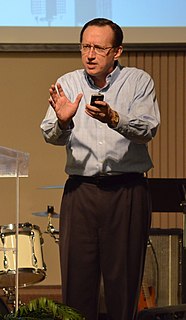A Quote by Charles Spurgeon
God's thoughts of you are many, let not yours be few in return.
Related Quotes
No man is greater than his prayer life. The pastor who is not praying is playing; the people who are not praying are straying. We have many organizers, but few agonizers; many players and payers, few pray-ers; many singers, few clingers; lots of pastors, few wrestlers; many fears, few tears; much fashion, little passion; many interferers, few intercessors; many writers, but few fighters. Failing here, we fail everywhere.
First examine what is constantly there in your mind, what is being repeated again and again. You don't have many thoughts. If you examine minutely you will see that you have only a few thoughts repeated again and again - maybe in new forms, new colors, new garments, new masks, but you have only a very few thoughts.
Jesus has many who love the kingdom of God, but few who bear a cross. He has many who desire His comfort, but few who desire His suffering. All want to rejoice with him, but few are willing to suffer for Him. He writes; there are many who admire his miracles, but there are few who follow in the humiliation of the cross.
God is the treasure, and where the treasure is, there is the heart. By this we may test our love to God. What are our thoughts most upon? Can we say we are ravished with delight when we think on God? Have our thoughts got wings? Are they fled aloft? Do we contemplate Christ and glory? A sinner crowds God out of his thoughts. He never thinks of God, unless with horror, as the prisoner thinks of the judge.
Knowledge about God is of two kinds, direct and indirect. Indirectly we can read scriptures, listen to sermons, consult authorities, and from these sources build a reasonable case that God exists. But such a God transmits no love to Earth. Therefore nothing substitutes for gyana, which is direct knowledge of the divine. Instead of having thoughts about God, you share God's own thoughts. Her thoughts can only be about Herself.
It's curious that the Church has become the most tightfisted at the very time in history when God has provided most generously. There's considerable talk about the end of the age, and many people seem to believe that Christ will return in their lifetime. But why is it that expecting Christ's return hasn't radically influenced our giving? Why is it that people who believe in the soon return of Christ are so quick to build their own financial empires--which prophecy tells us will perish--and so slow to build God's kingdom?



































